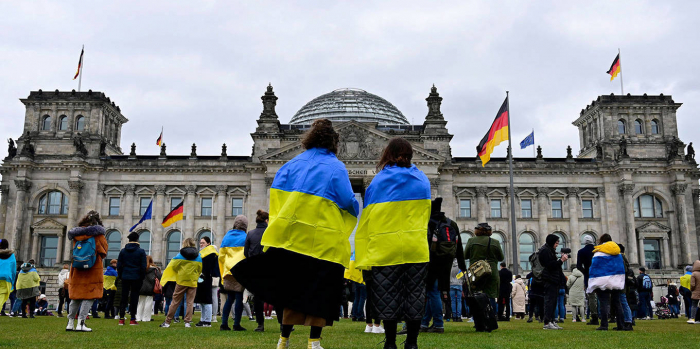“Decoloniality,” an intellectual framework for critiquing Western institutions, public discourse, and individual behavior, has been unable to confront Russia's genocidal war against Ukraine. That's because Western political and cultural institutions have long disregarded Eastern European perspectives in favor of the view from Moscow.
After the fall of the Berlin Wall and the collapse of the USSR, it was generally believed that Eastern Europe should simply catch up with the West. Liberated from Soviet rule, these states would undergo a natural and spontaneous transformation, smoothly assimilating into the Western economic, political, and social order. But Russia’s invasion of Ukraine has revealed that it is the West that must catch up with political developments in the East.
Europe’s East is different from what the West expected: its colonial and Soviet legacies complicate the simplistic binary division between the Global North and the Global South. That is why Western postcolonial scholars have traditionally overlooked Eastern Europe. But Russia’s war against Ukraine has thrown the legacy of brutal subjugation into sharp relief, forcing a reframing of the debates on colonialism. A proper debate begins when the colonized start talking about the colonizers, not just about themselves.
“Decoloniality,” an intellectual framework for critiquing perspectives that continue to pervade institutions, public discourse, and individual behavior, has become fashionable in Western culture and politics today. But this project of resistance is, for the most part, being applied internally, where it remains firmly grounded in the history of maritime empires and focused primarily on race.
Along with its fetishization of the Global South (a stance that is devoid of any meaningful political engagement), Western decoloniality fails to recognize the colonial trauma right next door. Western political and cultural institutions have long disregarded Eastern European perspectives in favor of the view from Moscow, the other imperial metropole and the West’s main point of reference.
Yet this ignores the legacy of German imperialism in Eastern Europe. In the 1930s and 1940s, Ukraine became a target of both the Soviet Union, which implemented a policy of industrial colonialism there, and the Nazis, who hoped to exploit Ukrainian agriculture for their own imperial project.
After World War II, Western colonial attitudes resurfaced in West German Chancellor Willy Brandt’s Ostpolitik. The relationship between officials in Bonn and Moscow was based on the assumption that there was no need to pay attention to Eastern Europe, including Ukraine: the Soviet state apparatus spoke for it. The colonized, by definition, lack subjectivity.
This helped shape the current political context in Eastern Europe, where armed conflict and authoritarian populism, hardened borders, and a fractured civil society underscore the need to decolonize Europe’s memory politics – and its recent history. After all, Germany, the powerhouse of the European Union, assumed its present form only in 1990. Throughout the twentieth century, Ukraine’s borders were more persistent and stable than Germany’s.
The most recent blow to Europe’s memory politics was the “denazification” discourse that the Kremlin used to justify its genocidal war against Ukraine. It’s an absurd argument: Europe, and the German-speaking world in particular, is supposed to accept a fossil-fuel fascist justifying his atrocities with references to the Holocaust? Unfortunately, many in the West do. But the Kremlin is merely recycling the Nazis’ argument: you are not supposed to exist, but, since you do, you must be eliminated.
Europe’s political apathy is deeply rooted in a colonial mindset, which is reflected in the EU’s externalization of problems. This strategy of pushing conflicts beyond the bloc’s borders to safeguard the interior has resulted in the EU confronting wars and authoritarian regimes to its south and east, which inevitably generate an influx of migrants fleeing violence.
Moreover, the EU’s typical response to ideological polarization is to default to a faux neutrality that can supposedly protect against the “extremes” that exist elsewhere. This normative neutrality also defines the approach of some Western cultural institutions and media toward Ukrainian voices speaking out against Russia’s imperialist aggression.
Seemingly opposed to affective truth, they limit the expression of strong emotions, as if the conflict can be judged only from some imagined rational, objective position. In deference to the Realpolitik approach to Russia’s war, many Western cultural institutions that had previously boasted of their political engagement and radical decoloniality retreated to the supposedly context-neutral “white cube”: the conventional exhibition space where art mediates reality against spotless walls under ideal lighting.
This response is, to a large extent, determined by the modus operandi of Europe’s cultural field. On one end, there are large institutions that toe the government line and are afraid of independent activity. On the other, there are collectives and curatorial groups that proclaim their commitment to participatory democracy but get nowhere because they discuss every detail endlessly and can agree on nothing. Whether an institution is vertical and highly centralized, or horizontal and participatory, political engagement seems impossible.
While many Western cultural institutions willingly bury their heads in the sand, others, such as in Hungary or Poland, have been hijacked by government-appointed right-wing directors. Either way, Europe’s creative institutions seem incapable of forging a new, more political path. But, as with the EU itself, simply staying within institutional borders and trying to preserve what’s inside will ultimately undermine their freedom. A viable decoloniality requires radical engagement – going out on a limb and fighting for a cause. When it comes to building such an anti-imperialist domain, Europe’s West has a lot to learn from its East.
Otherwise, when Realpolitik arrives next time, Western Europe shouldn’t be surprised to find itself frantically seeking another Zeitenwende, or historic turning point, and saying as usual:
I cannot determine the meaning
Of sorrow that fills my breast…
Vasyl Cherepanyn is Head of the Visual Culture Research Center in Kyiv and organizer of the Kyiv Biennial, an international forum for art, knowledge, and politics.
More about:
















































